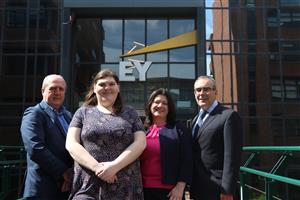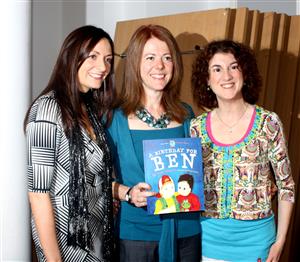Search Results
Search
Filter results
Advanced Filters
Your search returned 314 Solutions
-
The projects include a series of activities led by disabled people to empower other disabled people. Among these were the first ever national survey of disabled people in senior jobs, the first network of disabled people in senior jobs and a guide written by and for disabled people, rooted in stories and evidence of "what works".
Disability Rights UK, People with disabilites career development, United Kingdom -
A shortcut to the open labour market
The Pro ACT programme targeted the employment of 40 people with disabilities in the open labour market by eliminating the typical steps taken by many organizations in this field, such as training, sheltered employment, or employment with a job coach. As of June 2016, all 40 clients of were employed.
Pro ACT Suport Association, Romania -
Promoting inclusive business
The Kanchi's Ability Awards, launched in 2004, is a high profile business awards programme, recognising best practice for the inclusion of people with disabilities as employees, customers and members of the community. The Awards targets top 1,000 companies, public organisations and the SME sector.
Kanchi, Promoting inclusive business, Ireland -
Support for students with disabilities
The "Institute Integriert Studieren" is a teaching and research facility for accessibility and assisted technologies and a support centre for students with disabilities. Preparing graduates with disabilities for employment is considered an essential element. The measures aimed at students are supplemented by a mentoring system.
Johannes Kepler University Linz, Support for students with disabilities, Austria -
Training carers for the elderly
The project aims at training young persons with a disability or impairment, between the ages of 18 and 24, as in-patient care assistants in retirement or care homes, and at placing them in the primary job market. Two job coaches support the participants, organise internships and help them in their search for suitable employment.
Caritas Austria, Training carers for the elderly, Austria -

Internships for people with intellectual disabilities at a leading consultancy
The TCPID has established a higher education programme and supported transition to employment for people with intellectual disabilities. EY has been a core partner since 2017. By 2020 six graduates have completed paid internships, four of whom have been offered permanent employment.
TCIPD - Trinity Centre for People with Intellectual Disabilities, TCPID Graduate Internship programme, Ireland -

Creating a more accessible world for deaf children in Ireland
Sound Advice supports Inclusive Education for deaf children while empowering parents to develop their child’s full potential. The measures include public relations, training and counselling, but also reading promotion and mentoring. One success was that newborns in Ireland are entitled to digital hearing aids.
Sound Advice, Ireland -
The project fosters the inclusion of students with disabilities in mainstream primary education in Macedonia and Serbia. It introduces assistive technology, including e-accessible textbooks and educational applications, into mainstream instruction, and strengthens the capabilities of public schools.
The e-Accessible Education Project introduced assistive technology into mainstream primary schools in the country: schools were equipped with assistive computer peripherals (e.g. big-button keyboards, trackballs, etc.) and over 300 teachers were trained in using assistive technology in their work with students with disabilities.
Ecumenical Humanitarian Organisation, E-accessible education in Macedonia and Serbia, North Macedonia -
By promoting Europe-wide quality standards for accessible information for persons with intellectual disabilities, this innovative practice helps to create a solid framework for improving the access of persons with intellectual disabilities to information in line with Articles 9 and 21 of the UNCRPD.
The guidelines together with the European "easy-to-read" logo help set common standards and quality criteria for "easy-to-read". The standards help to unify the diverse approaches to producing accessible information for persons with intellectual disabilities. They have also helped to spread the "easy-to-read" concept.
Inclusion Europe, European standards for easy-to-read information, Belgium -
The first mobile bathroom for people with complex physical disabilities
Mobiloo – a Northern Irish social enterprise active throughout Ireland and the United Kingdom – has created the first mobile bathroom for people with complex physical disabilities at outdoor events. In addition to a clean toilet, Mobiloo bathrooms provide changing tables, hoists, and adequate space for large wheelchairs and/or a personal assistant.
AccessoLoo, Disability Pride Belfast & Vehicles for Change, United Kingdom